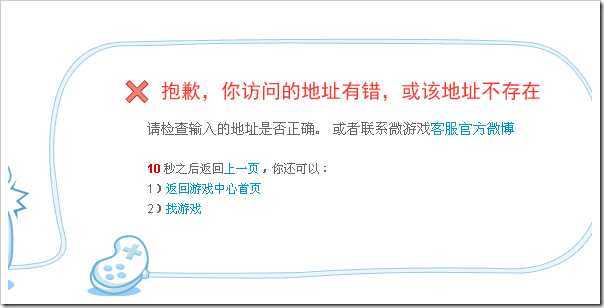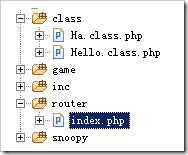标签:des style class blog code http
如果一个页面的内容呈现,需要根据url上传递的参数来进行渲染。很多时候可能是这样子写:xxx.com/xx?c=x&m=x& t=..,而我们看到的url往往是这样子的(以新浪微游戏的咖啡恋人为例) game.weibo.com/ilovecoffee….这种URL设计看上去比前一种更好一点:)
如果我们访问一下不存在的游戏应用,例如game.weibo.com/ilovecoffee222,则会输出如下的错误提示:

game.weibo.com后面匹配到的项,指向了某个php页面,然后根据参数获取要访问的游戏应用标识,后数据库或者缓存里查询该应用标识,如果不存在则输出错误提示,如果应用存在则加载游戏应用链接地址。
现在写一个php例子,假设我的ip为192.168.0.33,我加了一层名为router的路径,之后跟随的是 “/模块名/方法名/参数1的key/参数1的value/….”
类似这样的地址:
192.168.0.33/router/Hello/router/a/b/c/d/abc/index.html?id=3&url=http:………………
也就是要调用Ha这个模块中的router方法,并传入url后面的参数/a/b/c/d/index………….
第一步,首先要在服务器的配置上对/router/路径进行拦截

调用某个文件夹目录下的index.php页面,假定现在所有模块使用单独的文件存放于class目录下,该目录与router平级,如下图所示:

第二步,路由分发器的实现(index.php)
1: <!Doctype html>
2: <html>
3: <head>
4: <title>路由测试~~</title>
5: <meta http-equiv="content-type" content="text/html; charset=utf-8" />
6: </head>
7: <body>
8:
9: <?php
10:
11: date_default_timezone_set("Asia/Shanghai");
12:
13: define("MODULE_DIR", "../class/");
14:
15:
16: $_DocumentPath = $_SERVER[‘DOCUMENT_ROOT‘];
17: $_FilePath = __FILE__;
18: $_RequestUri = $_SERVER[‘REQUEST_URI‘];
19:
20: $_AppPath = str_replace($_DocumentPath, ‘‘, $_FilePath); //==>\router\index.php
21: $_UrlPath = $_RequestUri; //==>/router/hello/router/a/b/c/d/abc/index.html?id=3&url=http:
22:
23: $_AppPathArr = explode(DIRECTORY_SEPARATOR, $_AppPath);
24:
25: /**
26: * http://192.168.0.33/router/hello/router/a/b/c/d/abc/index.html?id=3&url=http:
27: *
28: * /hello/router/a/b/c/d/abc/index.html?id=3&url=http:
29: */
30:
31: for ($i = 0; $i < count($_AppPathArr); $i++) {
32: $p = $_AppPathArr[$i];
33: if ($p) {
34: $_UrlPath = preg_replace(‘/^\/‘.$p.‘\//‘, ‘/‘, $_UrlPath, 1);
35: }
36: }
37:
38: $_UrlPath = preg_replace(‘/^\//‘, ‘‘, $_UrlPath, 1);
39:
40: $_AppPathArr = explode("/", $_UrlPath);
41: $_AppPathArr_Count = count($_AppPathArr);
42:
43: $arr_url = array(
44: ‘controller‘ => ‘index‘,
45: ‘method‘ => ‘index‘,
46: ‘parms‘ => array()
47: );
48:
49: $arr_url[‘controller‘] = $_AppPathArr[0];
50: $arr_url[‘method‘] = $_AppPathArr[1];
51:
52: if ($_AppPathArr_Count > 2 and $_AppPathArr_Count % 2 != 0) {
53: die(‘参数错误‘);
54: } else {
55: for ($i = 2; $i < $_AppPathArr_Count; $i += 2) {
56: $arr_temp_hash = array(strtolower($_AppPathArr[$i])=>$_AppPathArr[$i + 1]);
57: $arr_url[‘parms‘] = array_merge($arr_url[‘parms‘], $arr_temp_hash);
58: }
59: }
60:
61: $module_name = $arr_url[‘controller‘];
62: $module_file = MODULE_DIR.$module_name.‘.class.php‘;
63: $method_name = $arr_url[‘method‘];
64:
65: if (file_exists($module_file)) {
66: include $module_file;
67:
68: $obj_module = new $module_name();
69:
70: if (!method_exists($obj_module, $method_name)) {
71: die("要调用的方法不存在");
72: } else {
73: if (is_callable(array($obj_module, $method_name))) {
74: $obj_module -> $method_name($module_name, $arr_url[‘parms‘]);
75:
76: $obj_module -> printResult();
77: }
78: }
79:
80: } else {
81: die("定义的模块不存在");
82: }
83:
84:
85: ?>
86:
87: </body>
88: </html>
获取请求的uri,然后拿到要加载的模块名、调用方法名,对uri参数进行简单的判断..
第三步,模块的编写
根据上述的uri,我们要调用的是Hello模块下的router方法,那么可以在class目录下定义一个名为Hello.class.php的文件(注意linux下是区分大小写的)
1: <?php
2:
3: class Hello {
4:
5: private $_name;
6: private $_varValue;
7:
8: function __construct() {
9:
10: }
11:
12: function router() {
13: $this->_name = func_get_arg(0);
14: $this->_varValue = func_get_arg(1);
15: }
16:
17: function printResult() {
18: echo $this->_name;
19: echo "<p>";
20: echo var_dump($this->_varValue);
21: echo "</p>";
22: }
23: }
24:
25: ?>
同理,我们可以编写Ha模块..
这算是实现了很简单的url路由分发功能了…
本文参考:
PHP实现一个简单url路由功能,布布扣,bubuko.com
标签:des style class blog code http
原文地址:http://www.cnblogs.com/kongxs/p/3799224.html